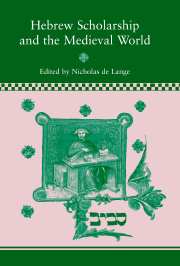Book contents
- Frontmatter
- Contents
- The contributors
- Preface
- List of abbreviations
- PART ONE NEW LINES OF INVESTIGATION
- 1 The study of medieval Karaism, 1989–1999
- 2 Hebrew scholarship in Byzantium
- 3 Hebrew philology in Sefarad: the state of the question
- 4 Some recent developments in the study of medieval Hebrew liturgy
- PART TWO THE HEBREW LANGUAGE
- PART THREE PRAYER AND POETRY
- PART FOUR THE WORLD OUTSIDE
- Bibliography of the writings of Raphael Loewe
- Index of names
1 - The study of medieval Karaism, 1989–1999
Published online by Cambridge University Press: 21 January 2010
- Frontmatter
- Contents
- The contributors
- Preface
- List of abbreviations
- PART ONE NEW LINES OF INVESTIGATION
- 1 The study of medieval Karaism, 1989–1999
- 2 Hebrew scholarship in Byzantium
- 3 Hebrew philology in Sefarad: the state of the question
- 4 Some recent developments in the study of medieval Hebrew liturgy
- PART TWO THE HEBREW LANGUAGE
- PART THREE PRAYER AND POETRY
- PART FOUR THE WORLD OUTSIDE
- Bibliography of the writings of Raphael Loewe
- Index of names
Summary
During the past decade the study of Karaism, its history and literature has begun to flourish. Over one hundred and fifty publications have appeared – a modest figure, perhaps, in comparison with scholarship on Maimonides, kabbalah, or medieval Hebrew poetry, but impressive in its own terms. And while a handful of eminences dominated Karaite studies in the previous decades, over sixty scholars contributed to the field during the 1990s. This growth may be attributed to three main factors: the general expansion of Jewish studies; the development of Judaeo-Arabic research in particular; and the reopening of the great Russian manuscript collections.
New scholars seek new areas of research; Karaite literature has proved attractive, at least in part, because of its relative neglect. At the same time, as the field of Judaeo-Arabic has come of age, attention has focused quite naturally on the extensive oeuvre of Karaite authors in tenth- and eleventh-century Jerusalem which includes pioneering works of Hebrew lexicography and grammar, theology, law, biblical exegesis, and Bible translations. Due to their abstruseness, magnitude and language, the great majority of these compositions remain unpublished. While substantial numbers of Karaite codices are available in Europe and the United States, by far the greatest repository of all Judaeo-Arabic manuscripts – especially Karaitica – remains the vast collections assembled by Abraham Firkovitch during the last century and preserved in the Saltykov-Shchedrin public library, St Petersburg. Until the recent collapse of the Soviet Union, Western specialists in Hebrew and Judaeo-Arabic literature were apt to speak of ‘the Leningrad Problem’, i.e. the possibility (probability?) that other, probably better manuscripts of the texts they were studying existed, inaccessibly, in Russia.
- Type
- Chapter
- Information
- Hebrew Scholarship and the Medieval World , pp. 3 - 22Publisher: Cambridge University PressPrint publication year: 2001



